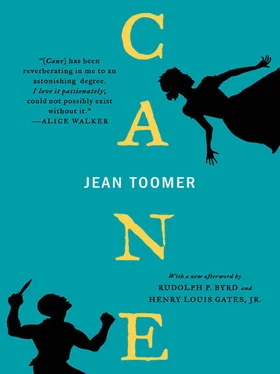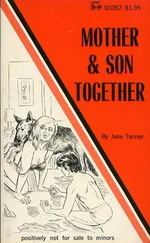Her skin is like dusk on the eastern horizon,
O cant you see it, O cant you see it,
Her skin is like dusk on the eastern horizon
…When the sun goes down.
Men had always wanted her, this Karintha, even as a child, Karintha carrying beauty, perfect as dusk when the sun goes down. Old men rode her hobby-horse upon their knees. Young men danced with her at frolics when they should have been dancing with their grown-up girls. God grant us youth, secretly prayed the old men. The young fellows counted the time to pass before she would be old enough to mate with them. This interest of the male, who wishes to ripen a growing thing too soon, could mean no good to her.
Karintha, at twelve, was a wild flash that told the other folks just what it was to live. At sunset, when there was no wind, and the pine-smoke from over by the sawmill hugged the earth, and you couldnt see more than a few feet in front, her sudden darting past you was a bit of vivid color, like a black bird that flashes in light. With the other children one could hear, some distance off, their feet flopping in the two-inch dust. Karintha’s running was a whir. It had the sound of the red dust that sometimes makes a spiral in the road. At dusk, during the hush just after the sawmill had closed down, and before any of the women had started their supper-getting-ready songs, her voice, high-pitched, shrill, would put one’s ears to itching. But no one ever thought to make her stop because of it. She stoned the cows, and beat her dog, and fought the other children…Even the preacher, who caught her at mischief, told himself that she was as innocently lovely as a November cotton flower. Already, rumors were out about her. Homes in Georgia are most often built on the two-room plan. In one, you cook and eat, in the other you sleep, and there love goes on. Karintha had seen or heard, perhaps she had felt her parents loving. One could but imitate one’s parents, for to follow them was the way of God. She played “home” with a small boy who was not afraid to do her bidding. That started the whole thing. Old men could no longer ride her hobby-horse upon their knees. But young men counted faster.
Her skin is like dusk,
O cant you see it,
Her skin is like dusk,
When the sun goes down.
Karintha is a woman. She who carries beauty, perfect as dusk when the sun goes down. She has been married many times. Old men remind her that a few years back they rode her hobby-horse upon their knees. Karintha smiles, and indulges them when she is in the mood for it. She has contempt for them. Karintha is a woman. Young men run stills to make her money. Young men go to the big cities and run on the road. Young men go away to college. They all want to bring her money. These are the young men who thought that all they had to do was to count time. But Karintha is a woman, and she has had a child. A child fell out of her womb onto a bed of pine-needles in the forest. Pine-needles are smooth and sweet. They are elastic to the feet of rabbits…A sawmill was nearby. Its pyramidal sawdust pile smouldered. It is a year before one completely burns. Meanwhile, the smoke curls up and hangs in odd wraiths about the trees, curls up, and spreads itself out over the valley…Weeks after Karintha returned home the smoke was so heavy you tasted it in water. Some one made a song:
Smoke is on the hills. Rise up.
Smoke is on the hills,
O rise And take my soul to Jesus.
Karintha is a woman. Men do not know that the soul of her was a growing thing ripened too soon. They will bring their money; they will die not having found it out…Karintha at twenty, carrying beauty, perfect as dusk when the sun goes down. Karintha…
Her skin is like dusk on the eastern horizon,
O cant you see it, O cant you see it,
Her skin is like dusk on the eastern horizon
…When the sun goes down.
Goes down…
Black reapers with the sound of steel on stones
Are sharpening scythes. I see them place the hones
In their hip-pockets as a thing that’s done,
And start their silent swinging, one by one.
Black horses drive a mower through the weeds,
And there, a field rat, startled, squealing bleeds,
His belly close to ground. I see the blade,
Blood-stained, continue cutting weeds and shade.
Boll-weevil’s coming, and the winter’s cold,
Made cotton-stalks look rusty, seasons old,
And cotton, scarce as any southern snow,
Was vanishing; the branch, so pinched and slow,
Failed in its function as the autumn rake;
Drouth fighting soil had caused the soil to take
All water from the streams; dead birds were found
In wells a hundred feet below the ground—
Such was the season when the flower bloomed.
Old folks were startled, and it soon assumed
Significance. Superstition saw
Something it had never seen before:
Brown eyes that loved without a trace of fear,
Beauty so sudden for that time of year.
Becky was the white woman who had two Negro sons. She’s dead; they’ve gone away. The pines whisper to Jesus. The Bible flaps its leaves with an aimless rustle on her mound.
Becky had one Negro son. Who gave it to her? Damn buck nigger, said the white folks’ mouths. She wouldnt tell. Common, God-forsaken, insane white shameless wench, said the white folks’ mouths. Her eyes were sunken, her neck stringy, her breasts fallen, till then. Taking their words, they filled her, like a bubble rising — then she broke. Mouth setting in a twist that held her eyes, harsh, vacant, staring…Who gave it to her? Low-down nigger with no self-respect, said the black folks’ mouths. She wouldnt tell. Poor Catholic poor-white crazy woman, said the black folks’ mouths. White folks and black folks built her cabin, fed her and her growing baby, prayed secretly to God who’d put His cross upon her and cast her out.
When the first was born, the white folks said they’d have no more to do with her. And black folks, they too joined hands to cast her out…The pines whispered to Jesus…The railroad boss said not to say he said it, but she could live, if she wanted to, on the narrow strip of land between the railroad and the road. John Stone, who owned the lumber and the bricks, would have shot the man who told he gave the stuff to Lonnie Deacon, who stole out there at night and built the cabin. A single room held down to earth…O fly away to Jesus…by a leaning chimney…
Six trains each day rumbled past and shook the ground under her cabin. Fords, and horse-and mule-drawn buggies went back and forth along the road. No one ever saw her. Trainmen, and passengers who’d heard about her, threw out papers and food. Threw out little crumpled slips of paper scribbled with prayers, as they passed her eye-shaped piece of sandy ground. Ground islandized between the road and railroad track. Pushed up where a blue-sheen God with listless eyes could look at it. Folks from the town took turns, unknown, of course, to each other, in bringing corn and meat and sweet potatoes. Even sometimes snuff…O thank y Jesus…Old David Georgia, grinding cane and boiling syrup, never went her way without some sugar sap. No one ever saw her. The boy grew up and ran around. When he was five years old as folks reckoned it, Hugh Jourdon saw him carrying a baby. “Becky has another son,” was what the whole town knew. But nothing was said, for the part of man that says things to the likes of that had told itself that if there was a Becky, that Becky now was dead.
Читать дальше











